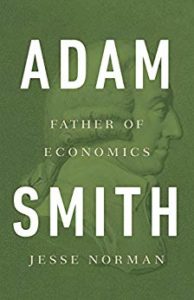Who Was Adam Smith?
By Maria Pia Paganelli


Born in Scotland in 1723, where he lived most of his life and where he also died in 1790, Adam Smith is a mythical figure who fathered the modern discipline of economics, embraced unbridled self-interest, and fought against the government to promote capitalism and the interest of business and the rich.
Jesse Norman’s goal in his recent biography, Adam Smith: Father of Economics,1 is to show that the mythical Adam Smith is, well… a myth. His tools are the availability of an immense body of scholarship and an awareness of current events.
But how it is possible? Adam Smith did coin the idea of “invisible hand” and claimed that we don’t get our dinner from the benevolence of the butcher, baker, and brewer, but from their self-interest.
True, we do not get dinner from the benevolence of the butcher, baker, and brewer, but that does not mean they are not benevolent, or that benevolence does not exist (or worse, should not exist), and it does not even mean that morality (or anything other than self-interest) is nowhere to be found in markets. “The reason why humans and not dogs can make ‘fair and deliberate exchange’ of one thing for another is because exchanges presuppose a shared context of fairness… ” (page 181).
In fact, Smith’s first published book, The Theory of Moral Sentiments [1759], is a study on how we humans develop shared ideas of fairness and morality. Our morality is not derived from a divinely inspired moral sense, as Smith’s teacher Francis Hutcheson suggested, nor is it a sham to cover our self-liking as Bernard Mandeville suggested. For Smith, it is the result of a triangulation between an actor, an action, and a viewer (being either real or imaginary). Morality and sociability are thus entangled, natural, and not corrupted by society, as Jean-Jacques Rousseau had claimed instead.
As a matter of fact, the more society advances, the more commercial it becomes, that is, the more customs and mores refine and soften, rather than corrupt. Brutality and violence decrease. Women are better treated and increasingly recognized as equal. If in the past they were legally discriminated against, it was because men were the ones making the laws. (We still have a long way to go, given that in 2014 in the United States only 12% of the economists in academia were women). Slavery is also increasingly condemned. It faces the upward battle against our desire to domineer, but its inefficiency and the growing recognition of human equality that commercial societies foster brings hope.
But Smith is not Pollyanna. He recognizes the “pathologies” of commercial societies. Our tendency to admire the rich and powerful may blind our judgment. And our desire to better our condition may create powerful special interests that successfully lobby to create and maintain benefits for themselves at the expense of society. The entire “mercantile system” is an example of this pathology. The British built the system of tariffs and subsidies, as well as the entire colonial apparatus, to benefit themselves at the expense of a higher universal opulence which would have been present in their absence. Smith’s attacks against crony-capitalism are even more remarkable when we think they were written before what we today call capitalism.
The problem with mercantile special interests is that they also have asymmetric bargaining power compared to the working poor. The merchants and manufacturers can hold out for a long time, while the working poor can hold out only for a few days at best. The masters can and do maintain exceeding low wages and poor working conditions, and manage do to so with the backing of the law. The working poor, on the other hand, work from a very young age for long hours at repetitive tasks so much so that they eventually experience a sort of “mental mutilation.”
So while it is true that Smith loudly calls for government non-interference in the economy, when that interference is dictated by cronyism and special interests, it is also true that he does not hesitate to call for government intervention to favor the working poor. Compulsory education, with possible provision for building schools, and support for public diversions are examples to offer remedies to the possible deformation or destruction of the moral imagination and judgment of the working poor. Not to mention a series of public works—mostly of infrastructure but also a ban on small denomination notes and a cap on interest rates—that would facilitate commerce and thus bring that universal opulence that benefits mostly the poor (among whom child mortality was still astonishingly high).
Even the mythical invisible hand of the elegant mathematical general equilibrium Arrow-Debreu model [see Kenneth Arrow and Gerard Debreu] or of the promoters of laissez-faire is not to be found in Smith. Smith’s invisible hand is more of a complex evolutionary phenomenon of historical markets, embedded in a political society which co-evolve with institutions, laws, and manners. Commerce, and the competition within it, not laissez-faire, does bring about both universal opulence and freedom. Global inequality is decreasing indeed. But the pathologies are not to be ignored, as the rising inequality within the most developed countries indicates. The “science of the legislator”, rather than the actions of “that insidious and crafty animal, vulgarly called… politician” (page 334, citing Smith) is thus a possible solution to contain the pathologies of commercial societies while keeping them flourishing and bringing all their unintentional and unplanned benefits.
For more on these topics, see Jesse Norman on Adam Smith by Alberto Mingardi, EconLog, October 24, 2018. See also the EconTalk podcast episode, Russ Roberts and Mike Munger on How Adam Smith Can Change Your Life.
For some basics, see Self Interest Rightly Understood by Lauren Hall, AdamSmithWorks.org.
Norman’s book is a remarkable analysis that shows both the complexity of an 18th century intellectual and his relevance for today. Even more so, given that this author is not a formal Smith scholar, but a British politician. Or shall we say, a legislator?
Norman’s prose is accessible to non-specialists and offers a fairly rounded and balanced picture of Smith. Specialists will not find any ground-breaking analysis. Yet they may find the book a valuable and complete general account of the state of the literature on Smith today as well as its continuous relevance. Even if the references in the text are extremely sparse, the bibliography is rich. And given the amount of secondary literature produced even just in the last decade, Norman had to pick his battle: he focuses on books, rather than articles, probably a wise choice as the number of articles is in the thousands. A stimulating book, in the eyes of this reviewer, worth reading.
*Maria Pia Paganelli is associate professor of economics at Trinity University. Maria’s research focuses on the history of economic thought, specializing in the 18th century. She is particularly interested in Adam Smith, David Hume, monetary theories, and the Scottish Enlightenment and analyzes how self-interest interacts with other motivational drives, with systematic biases, and with the surrounding institutional environment. She also explores the links between the Scottish Enlightenment and the results from behavioral economics, evolutionary biology, neuroeconomics.
